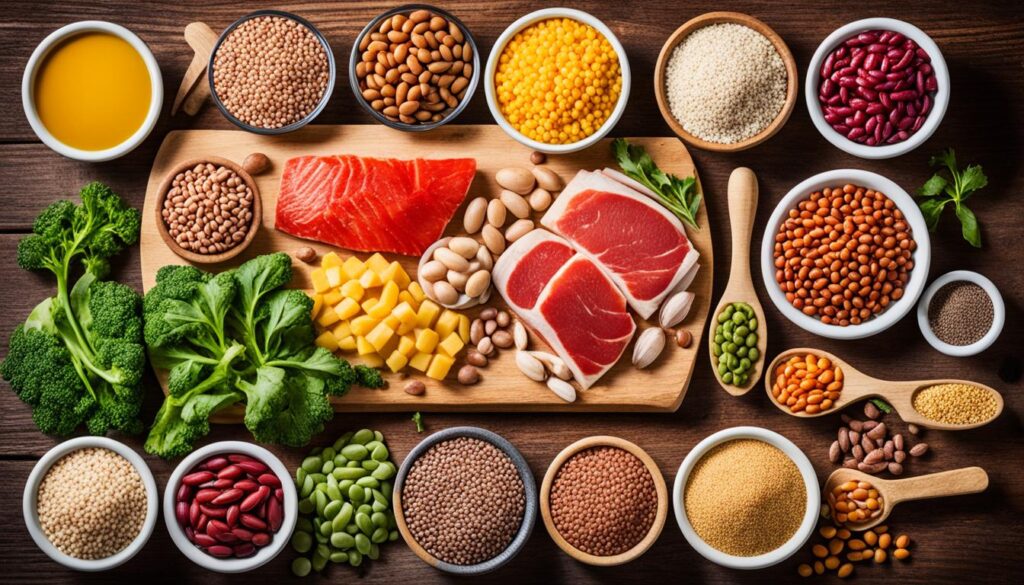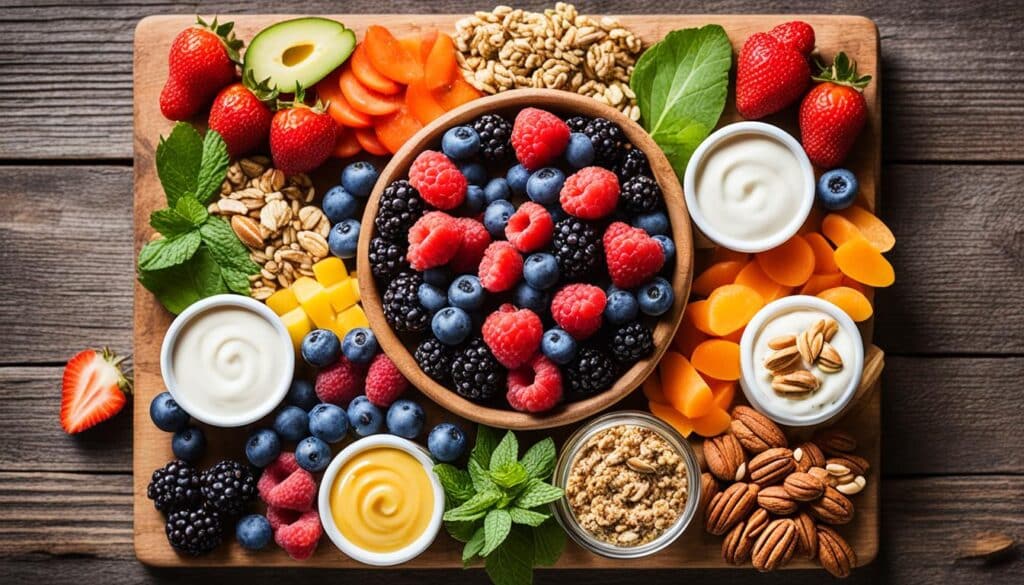Gaining weight can be tough, just like losing it. If you have a fast metabolism or health issues, adding pounds can be hard. This article will share tips and strategies for healthy weight gain. It will help you reach your goals safely and sustainably.
Key Takeaways : Healthy Weight Gain
- Understand your body’s unique nutritional needs and caloric requirements to tailor your weight gain journey.
- Incorporate protein-rich foods like lean meats, fish, eggs, and dairy to support muscle building.
- Introduce frequent, healthy snacking to increase your overall caloric intake.
- Engage in strength training exercises to turn extra calories into muscle instead of fat.
- Monitor your progress regularly and make adjustments to your plan as needed.
Understand Your Body’s Nutritional Needs
To start gaining weight healthily, it’s key to know what your body needs. Your caloric requirements, metabolic rate, and body type are crucial. They help shape how you should gain weight.
Start by using online weight gain calculators to figure out how many calories you need daily. These tools look at your age, gender, activity level, and weight to give you a starting point. But remember, these are just rough estimates. Your actual needs might be different because of your metabolism and health.
Knowing your body type helps you make a better diet plan. Whether you’re an ectomorph, mesomorph, or endomorph, your body reacts differently to food and exercise. Use this info to make a diet plan that helps you gain weight in a healthy way.
| Body Type | Characteristics | Nutritional Approach |
|---|---|---|
| Ectomorph | Naturally thin, struggles to gain weight | Focus on calorie-dense, nutrient-rich foods and strength training |
| Mesomorph | Athletic build, gains muscle easily | Balanced diet with emphasis on protein and resistance training |
| Endomorph | Naturally larger, prone to storing fat | Prioritize complex carbs, healthy fats, and moderate cardio |
By knowing your caloric requirements, metabolic rate, and body type, you can make a diet plan just for you. Remember, gaining weight healthily isn’t just about eating more. It’s about giving your body the right nutrients to build muscle and tissue.
Incorporate Protein-Rich Foods in Your Diet

Starting your weight gain journey means adding protein-rich foods to your meals. Protein helps your muscles grow, making it key for your diet. Eating different types of protein helps your body build and keep lean muscle, which helps you gain weight.
Lean meats like chicken, turkey, and beef are great for getting more protein. They give you the amino acids your muscles need and are full of other important nutrients. Seafood, including fatty fish like salmon and tuna, also has lots of protein and healthy fats for a balanced diet.
Eggs and dairy products, like milk, yogurt, and cheese, are easy to add to your meals and snacks. For vegetarians, beans, lentils, nuts, and seeds are good plant-based protein sources. These can work well with animal-based proteins for a balanced diet.
It’s not just about eating protein. You need to make sure your meals have complex carbs and healthy fats too. This mix of nutrients gives your body the fuel it needs for muscle building and gaining weight.
“Protein is the building block for muscle growth, making it an essential component of your weight gain journey.”
- Lean meats (chicken, turkey, beef)
- Fatty fish (salmon, tuna)
- Eggs and dairy products
- Beans, lentils, nuts, and seeds
By eating protein-rich foods and balancing your diet, you can help your body build muscle naturally. This approach makes gaining weight healthy and sustainable.
Introduce Frequent and Healthy Snacking

Snacking can help you gain weight. Adding calorie-dense foods between meals can increase your caloric intake. This supports your weight gain goals. Snacks like nuts and Greek yogurt give you important nutrients and calories. They keep you full and energized all day.
Fuel Up with Nutrient-Rich Snacks
Choose snacks that are tasty and full of nutrients. Here are some weight gain snacks to try:
- Handfuls of nuts like almonds, cashews, or walnuts for healthy fats and protein
- Creamy Greek yogurt with fresh fruit or granola
- Protein-rich protein shakes or smoothies with milk, nut butter, and frozen berries
- Chewy granola bars or energy bites for a satisfying crunch
- Refreshing fruit smoothies blended with milk, yogurt, and a touch of honey
Snacking on these foods all day can increase your caloric intake. This way, you don’t just eat calorie-dense foods without getting enough nutrients.
“Snacking on the right foods can be a game-changer in your weight gain journey. It’s all about finding the right balance between calorie-dense and nutrient-dense options.”
Try Strength Training Exercises

Strength training is key for gaining healthy weight. It helps turn extra calories into lean muscle, not fat. Include exercises like squats, deadlifts, push-ups, and pull-ups. These work many muscles and help grow muscle overall.
Unlock the Power of Compound Movements
Compound exercises like squats and deadlifts are great for building muscle and gaining weight. They work many muscles at once, making your workouts efficient and helping muscle growth. As you get stronger, add weights to your routine to keep challenging your muscles.
- Squats: Target the legs, hips, and core muscles.
- Deadlifts: Work the back, legs, and grip strength.
- Push-ups: Engage the chest, shoulders, and triceps.
- Pull-ups: Strengthen the back, biceps, and grip.
Building muscle is important for healthy weight gain. It makes sure the extra calories you eat help your fitness goals.
“Strength training is the foundation for building a strong, muscular physique.”
Pair your strength training with a diet rich in protein for muscle growth and recovery. Regular strength training turns extra calories into lean muscle. This leads to healthier and lasting weight gain.
Keep Track of Your Progress

It’s important to keep an eye on your weight gain to make sure you’re growing healthily. Weighing yourself and taking body measurements regularly helps you track your weight gain progress. This way, you can adjust your diet and exercise as needed.
Weigh Yourself Regularly
Stepping on the scale at the same time each week gives you valuable insights. Look for steady, slow weight increases. Avoid sudden or unpredictable changes.
Take Body Measurements
Along with weighing yourself, take regular body measurements. Measure your chest, waist, hips, and arms. This helps you see how your body is changing.
Keep a Food Diary
Keeping a detailed food diary or using a calorie-counting app is key. It helps you meet your daily calorie counting goals. Record what and how much you eat to find areas to improve.
“Consistency is key when it comes to weight gain. Keep track of your progress, and celebrate your small victories along the way.”
By carefully monitoring your weight gain progress, body measurements, and food tracking, you can make smart choices. This keeps you motivated on your path to a healthier, stronger body.
Healthy Weight Gain

Gaining weight in a healthy way is key to reaching your fitness goals. Focus on building muscle mass with a balanced diet and strength training. This way, you gain weight from muscle, not just fat.
Being patient and consistent is vital for healthy weight gain. It’s a slow process that needs dedication and a balanced lifestyle. Here are some steps to begin:
- Find out how many calories you need based on your body and activity level. Use online tools to estimate your daily caloric needs for muscle gain.
- Add protein-rich foods like lean meats, fish, eggs, dairy, beans, nuts, and seeds to your diet. Also, include carbs and healthy fats for a balanced approach.
- Have calorie-dense snacks often between meals to up your calorie intake. Good choices include nuts, Greek yogurt, protein shakes, granola bars, and fruit smoothies.
- Do strength training exercises like squats, deadlifts, push-ups, and pull-ups to build muscle. This helps turn extra calories into muscle, not fat.
Healthy weight gain is a journey, not a quick fix. By focusing on muscle growth over fat, you can reach your sustainable weight gain goals while staying healthy.
| Nutrient | Recommended Daily Intake for Weight Gain |
|---|---|
| Calories | 500-1000 above maintenance level |
| Protein | 1.6-2.2 grams per kilogram of body weight |
| Carbohydrates | 45-65% of total daily calories |
| Fats | 20-35% of total daily calories |
“Healthy weight gain is a gradual process that requires dedication and a well-rounded lifestyle. Patience and consistency are key to achieving your fitness goals.”
Remember the Importance of Rest and Sleep

A balanced diet and regular exercise are key for gaining weight healthily. But don’t forget the role of rest and sleep. Good sleep quality is vital for muscle recovery and growth. Your body recovers and grows during sleep.
Experts suggest getting 7-9 hours of sleep each night for rest and recovery. Also, taking rest days between workouts lets your muscles heal and grow back stronger. By focusing on sleep and weight gain, you help your fitness goals and make the most of your nutrition and exercises.
“Adequate sleep is just as important as proper nutrition and exercise for muscle growth and recovery.”
The Benefits of Prioritizing Rest and Sleep
- Improves muscle recovery and repair, leading to more muscle mass
- Helps the body’s natural anabolic processes, key for weight gain
- Boosts sleep quality, making you feel rested and ready for workouts
- Lessens the chance of overtraining and injuries, keeping your weight gain on track
Putting rest and sleep first is key to long-term success in weight gain. Add these tips to your routine and see your body improve with better muscle recovery and steady weight gain.
Also Read : The Importance Of Pediatric Care For Children Health
Conclusion
Getting healthy weight gain means looking at your nutrition, exercise, and lifestyle together. It’s important to know what your body needs. Adding protein-rich foods, doing strength training, and getting enough rest helps a lot.
This process takes time and patience, but it’s worth it for a stronger, more confident you. Healthy weight gain is a journey, not a quick fix.
Start this journey, celebrate your wins, and discover your full potential. Using healthy weight gain tips, weight gain methods, muscle building workouts, and a balanced lifestyle will help you reach your goals. Keep going, stay true to your plan, and see your efforts pay off.
Your health and fitness goals are special to you, so make your plan fit you. With the right attitude, hard work, and the advice in this article, you’re on the right path to gaining weight healthily. Start this journey and let it make you the best version of yourself.
FAQs
Q. What are the key steps to achieve healthy weight gain?
To gain weight healthily, start by understanding your body’s nutritional needs. Add protein-rich foods to your diet. Snack often but choose healthy options. Also, focus on strength training and getting enough rest and sleep.
Q. How can I determine my daily caloric requirements for weight gain?
Use online calculators to find out how many calories you need to gain weight. These tools look at your metabolism, body type, and activity level. This helps you make a diet plan that fits you.
Q. What are some protein-rich foods that can support muscle building and weight gain?
Foods like lean meats, fish, eggs, dairy, beans, nuts, and seeds are great for muscle building and gaining weight. Mix these with carbs and healthy fats for a balanced meal plan.
Q. How can snacking help with my weight gain goals?
Snacking on calorie-dense, nutritious foods can increase your calorie intake. Try nuts, Greek yogurt, protein shakes, granola bars, and fruit smoothies. These snacks give you important nutrients and calories.
Q. What types of strength training exercises are effective for building muscle mass?
Squats, deadlifts, push-ups, and pull-ups are great for building muscle. These exercises work many muscles at once. They help turn extra calories into muscle, not fat.
Q. How can I track my weight gain progress effectively?
Keep track of your progress by weighing yourself regularly and taking body measurements. Also, keep a food diary or use a calorie-tracking app. This helps you see what’s working and what needs improvement.
Q. Why is the importance of rest and sleep often overlooked in weight gain?
Getting 7-9 hours of sleep each night is key for muscle repair and growth. Rest days between workouts let your muscles recover and rebuild. This supports your weight gain efforts.
Source Links
- https://medium.com/@m.shoaibsaleem113/unlocking-the-secrets-to-rapid-and-healthy-weight-gain-27e71fc4510c
- https://medium.com/@globalabi2023/unlocking-the-secrets-to-healthy-weight-gain-with-fast-weight-gain-capsules-1025ad434b38
- https://www.fulllifehormone.com/blog/hormones-and-weight-management-unlocking-the-secrets-to-a-healthy-body.html








Leave A Comment